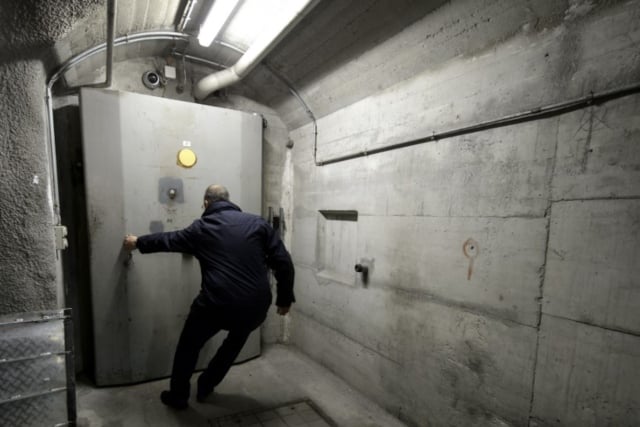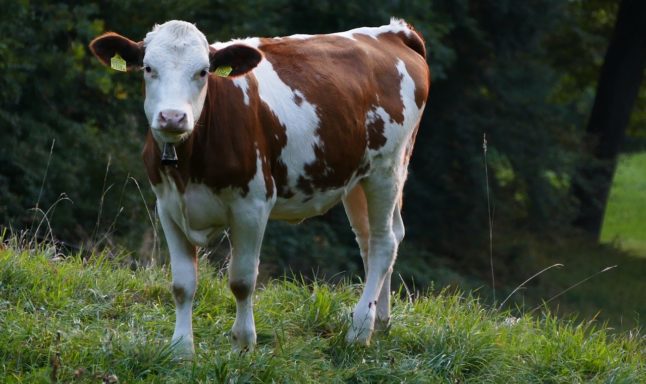Russia’s invasion of Ukraine reignited interest in Switzerland’s strategic stockpiles, a government-mandated reserve so that the country survives in case of natural and man-made disasters.
What gets kept in the stockpile depends largely on what is deemed “essential for life”.
In late 2019, the Swiss government delayed a planned decision on whether or not to scrap the country’s three-month mandatory coffee reserves.
The Swiss Federal Office for National Economic Supply (FONES) had decided in April 2019 that coffee is not “essential for life” and therefore should not be kept as part of the country’s strategic reserves.
But after a caffeine-fuelled outcry from coffee drinker, the authority indicated it would review the decision in November. The review has now been delayed until January.
The strategic reserve includes everything from food to medications and has been kept since the end of the Second World War.
But alongside potentially coffee, what else is considered essential for life in Switzerland?
If a natural disaster, pandemic, bio-terror attack, or large-scale strike occurs, disrupting or exhausting supply chains – what does Switzerland have in its collective cupboard?
FONES does not itself stockpile goods, but instead requires some 300 private companies to do so under the National Economic Supply Act and covers the storage costs.
Read also: Switzerland’s annual emergency siren test – what you need to know
The reserves are grouped into four categories: foodstuffs, energy, therapeutic products and industrial goods. The companies’ stockpiling is supported by loans, tax relief, and money from indemnification funds, and ultimately these costs are passed on to consumers.
The reserves themselves are worth a total of 2.4 billion Swiss francs (€2.12 billion), but the stockpiling ends up costing Swiss residents a mere 14 francs each per year – a pretty good deal, and another example of where Switzerland comes off as inexpensive.
Here is what is being stored:
Foodstuffs
Switzerland produces about half of the food required by its population and is therefore reliant on imports to meet needs. The government’s compulsory stocks of foodstuffs are designed to bridge the gap in the event of an interruption in supply, or if there are severe shortages. Here are the foodstuffs in reserve.
Coffee: The strategic coffee reserve is supposed to last three months and is made up of around 15,000 tonnes of coffee beans. The reserve is stored by fifteen firms across Switzerland including Nestle and Migros, meaning there’s unfortunately no central stockpile where one can backstroke across it like Scrooge McDuck.
Sugar: Switzerland is highly self-sufficient in sugar production, producing some 305,000 tonnes of sugar per year from domestically grown sugar beets. Nevertheless, it stockpiles three months’ worth of sugar, or 69,000 tonnes. That’s enough to make a rather large sugar cube: about 40 metres on each edge.
Rice: In stark contrast to sugar, Switzerland only produces one percent of the rice it consumes. Noting that rice is an important gluten-free source of carbohydrates, FONES mandates reserves equivalent to four months’ consumption, or 14,000 tonnes – a rice cube 26 metres on each edge.
Cooking oils and fats: Over three quarters of the cooking oil used in Switzerland is imported. Four months’ worth is stockpiled, mostly in tanks and large-scale containers, where it can be kept for several years. These 32,750 tonnes of oil would fill a silo 20 metres in diameter and 115 metres high.
Read also: INTERVIEW – My goal is to dig up the outrageous facts about Switzerland that startle you
Wheat: Switzerland boasts a high degree of self-sufficiency in soft wheat, which is used to make bread, but imports most of its durum wheat (think pasta). Stockpiles include 160,000 tonnes of soft wheat and 34,500 tonnes of durum wheat for human consumption, with a further 140,000 tonnes of soft wheat earmarked for either human or animal consumption.
Yeast: If you’re going to make bread with your 300,000 tonnes of soft wheat, you’re going to need some yeast. Quite a lot of yeast. Yeast is grown in a culture medium produced by combining molasses and thick beet juice and adding ammonia salts, phosphates and B vitamins. Switzerland accordingly stockpiles 900 tonnes of molasses and thick beet juice, and 16 tonnes of ammonium salts and phosphates—enough to cover one month’s demand.
Things you might not want to eat: 17,300 tonnes of nitrogen fertilizer and 182,000 tonnes of concentrated animal feed are stored to help produce more food. Seeds, pesticides, and infant formula are under review.
Energy
Fossil fuels: Switzerland stockpiles 4.5 months’ worth of gasoline, diesel, heating oil and extra-light heating oil—which can substitute for natural gas in dual-use heating systems – as well as 3 months of kerosene (jet fuel). If you collected all of this fuel together it would fill over 2000 Olympic swimming pools.
Nuclear fuel: Swiss nuclear reactors annually consume fuel elements derived from about 600 tonnes of natural uranium. The power companies are required to stock one year’s worth of fuel elements for two of the reactors. This number will decline as the power plants are phased out over the course of the next two decades.
Therapeutic products
Antibiotics: Switzerland depends on imports for the majority of its supplies of anti-infectives. It maintains a three-month supply of antibiotics, anti-fungals and tuberculostatics in commercially prepared form. Another 2–3 month’s supply of active agents would allow additional doses to be prepared. Switzerland also keeps two months’ worth of veterinary anti-infectives on hand.
Tamiflu: Stocks of Tamiflu would cover treatment of 25 percent of the populationin the event of an influenza pandemic, as well as 40 days of preventive treatment for health-care providers. Stocks include over 26 million capsules for immediate use as well as 1,300 kilograms of Oseltimivir, the active ingredient, which keeps longer than the capsules.
Strong analgesics and opiates: Stocks consist of 181 kilograms in oral liquid, oral solid, parenteral, rectal, and transdermal dosage forms.
Blood-clotting drugs: For the 750 haemophiliacs in Switzerland, a three-month reserve is on hand.
Insulin: For the half-million diabetics living in Switzerland, a two-month supply of insulin is stockpiled.
Blood bag systems: Systems for collecting, storing and transfusing donated blood are produced by only three companies in Switzerland, one of which represents over 50 percent of the market. Disruption of production could thus easily lead to shortages. In 2015 it was decided to up the stockpile of blood bags to 80,000.
Respirator and surgical masks, surgical gloves: In 2013 it was decided to greatly increase the quantities of respirator and surgical masks, and to increase the supply of surgical gloves from five million to 104 million. All three are primarily produced in Asia, and FONES considers it likely that, in the event of the emergence of a new and aggressive pathogen, supplies would rapidly dry up.
Vaccines: Since October 2016 the process of building up a stockpile of vaccines has been underway, with the aim of accumulating a four-month supply.
Read also: Two die from measles in Switzerland as cases rise
Industry
Switzerland imports all of the granulates that are used to make plastics such as polyethylene, polystyrene, polypropylene, and PET, which are used in packaging foodstuffs and medicines.
Pandemics would create a sudden surge in global demand for plastic granulatesin order to produce packaging for medicines and disinfectants.
For this reason, FONES is currently reviewing the quantities of polystyrene, polyethylene, and various additives to stockpile.
Meanwhile…
FONES asks Swiss residents to keep a personal stockpile on hand as well. This list includes nine litres of water per person, a week’s worth of food, a battery-operated radio, flashlights, batteries, candles, matches, a gas cooker, hygiene articles (including toilet paper), medications, cash and pet food.
A final decision about the coffee stockpile is to be made in January 2020 – so if you’re a coffee addict, and you want to play it safe – you might just add three months’ worth of espresso beans to that list.
Ashley Curtis is the author of “O Switzerland!“: Travelers’s Accounts, 57 BCE to the present (Bergli Books, 2018) and of Why Do the Swiss Have Such Great Sex?, also published by Bergli.



 Please whitelist us to continue reading.
Please whitelist us to continue reading.
Member comments